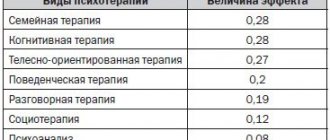While growing up, a child faces many challenges, including teenage stress. Stress is a common cause of mental illness among adolescents. If you do not provide the child with proper support during adolescence, then everything can end with a nervous disease at a more mature age, which is practically untreatable.
If parents notice drastic changes in a teenager’s behavior—he changed his hobbies, stopped being interested in things that had been dear to him for a long time—then this indicates some problems. You shouldn’t immediately start pestering your child with questions about love, problems at school or with drugs; you need to get advice from a teenage psychologist. About how to identify a disorder by symptoms, how to help a child survive a difficult period. Let's take a closer look at this.
Signs of mental disorders in teenagers
It is during adolescence that many mental illnesses begin to form, including schizophrenia and various types of psychoses. Signs of such disorders include the following symptoms:
- the child has a new hobby to which he devotes all his time, but there is no success;
- abruptly abandoned old hobbies;
- began to do poorly at school when he had previously achieved significant success;
- I lost interest in everything I was previously passionate about.
But these symptoms do not 100% indicate mental disorders in adolescents. Perhaps this is how the accentuation of character manifests itself, which we will discuss in the following sections.
Diagnosis of mental disorders
The main distinguishing feature of the disease in young people is emotional detachment and isolation.
The child does not want to communicate with his classmates and acquaintances and spends time in solitude. Such children have no friends and do not have the usual aspirations for their age. They do not want to become part of the team, establish themselves in it, attract attention to themselves, or stand out in any way. Both girls and boys are susceptible to developing the disease. Most of them are characterized by sluggish, continuous progression, while the minority are characterized by episodic, paroxysmal progression. Some cases are aggravated by autism and oligophrenia-like defect.
The main cause of mental disorder is considered to be a dysfunction of the brain. Several factors contribute to this.
- Genetic predisposition. If both parents in a family suffered from this disease, the probability of the child’s disease will be about 50%. Even if the child’s ancestors suffered from schizophrenia several generations ago, the risk of contracting the disease remains quite high – up to 10%.
- Psychological trauma received in childhood. They relate to the moral oppression and suppression of a child by his parents. A child may become an unwitting witness to scenes of domestic physical or sexual violence. At the same time, he does not have the opportunity to support his loved one, to tell someone about what he saw and heard. The child experiences a strong fear of punishment. Such cases contribute to the splitting of the psyche and the development of undesirable changes in the cerebral cortex.
- Viral infections and other serious diseases suffered by a woman during pregnancy, as well as injuries received during childbirth.
- Consumption of alcoholic beverages and drugs. In adolescence, the danger of this particular risk factor increases significantly. Modern synthetic drugs that young girls and boys try to satisfy their curiosity lead to rapid addiction and the formation of addiction. The negative impact of psychotropic substances leads to severe mental disorder.
There are several stages of development of the disease in adolescent children.
First stage.
The first signs of schizophrenia in adolescents are observed at the age of 12-15 years. They are expressed:
- depression;
- sharpening of character traits;
- the presence of phobias, especially about one’s appearance;
- depersonalization – the child feels a change in the perception of his own “I”;
- difficulty in establishing contacts with others.
This stage corresponds to the age of 16-20 years. All of the above signs of schizophrenia, characteristic of a 15-year-old teenager, begin to progress rapidly. Now they are expressed more clearly and sharply. It is at this stage that the first visions, hallucinations, delusional and obsessive ideas, and hypochondria appear. At the same time, mental abilities continue to deteriorate - thinking becomes inhibited, speech, memory and concentration disorders are observed.
This stage corresponds to the age of 20-25 years. Thanks to effective therapy and an individually developed treatment regimen, it is possible to get rid of most productive symptoms in the form of delusions, hallucinations, increased excitability, and also to compensate for cognitive functions. The patient can re-adapt to society, re-enter the university and continue his studies.
Some patients may retain residual effects of negative symptoms - detachment and detachment from the outside world, isolation, infantilism. The weak expression of these signs will not be an obstacle to leading a normal, fulfilling life.
Depending on the form of schizophrenia in children, a predominance of one of the following types of symptoms is observed.
Heboid syndrome.
It is characteristic of the hebephrenic form of schizophrenia. The child develops an increased interest in cruelty and violence. He begins to watch horror films that show scenes of disasters and murders. If there are younger brothers or sisters in the family, they are bullied by the older, sick child.
Symptoms and signs of schizophrenia in adolescents with pronounced heboid syndrome also manifest themselves in immoral behavior. The child's actions and behavior are aggressive. He expresses his desire for freedom in vagrancy - he leaves home, spends the night on the street, in basements or attics. Under the influence of negative environmental factors, he begins to use alcohol and drugs. In a state of passion, he commits thefts or more serious offenses.
Parents who notice strange behavior in their child or their manifestation of unreasonable cruelty are strongly recommended to urgently seek help from a psychiatrist. Although heboid syndrome is the most difficult to treat, with timely and adequate treatment, good results can be achieved - a state of remission can be achieved.
Call the Ravnovesie clinic by phone at any time. We work around the clock. If necessary, we will arrange for a psychiatrist to visit your home to provide emergency medical care and help with transporting the child to the hospital. We provide all services anonymously. After successful treatment, the child will be able to return to school or university without fear of publicity.
This is a passion for philosophical ideas, mysticism, spiritualism, the other world, parapsychology and bioenergy. Sick children treat their peers with arrogance and cynicism, considering themselves superior and smarter than them. They prefer loneliness to communicating with friends. Young girls and boys become obsessed with their own appearance, considering themselves ugly and unattractive. Such thoughts greatly reduce their self-esteem - they make them indecisive and unsure of their own abilities.
Any form of schizophrenia contributes to a gradual deterioration of cognitive function. The child has difficulty perceiving and assimilating new information; it becomes difficult for him to complete homework and concentrate on lessons. As a result, school performance drops sharply. Impairment of mental abilities occurs due to inhibition of thinking, impoverishment of the emotional sphere and weakening of volitional qualities.
Such symptoms develop against the background of phobias of ugliness and depression. The child perceives reality inadequately and becomes suspicious. He evaluates all the actions and deeds of his relatives inadequately, believing that behind his back he is only criticized, condemned and condemned.
If your child's behavior is causing concern and you don't know what to do, consult a specialist. Our clinic employs experienced psychiatrists who will definitely help you. Make an appointment by phone: 7 (499) 495-45-03.
As noted above, diagnosis of the disease in adolescence is complicated by the similarity of symptoms with an age-related, adolescent crisis or weak expression, blurred signs. An accurate diagnosis can only be made by a psychiatrist, after conducting a series of studies and monitoring the patient for 2-6 months.
In their work, our specialists use all available tools.
- Clinical and anamnestic method. The psychiatrist talks with the patient himself and his parents. Through conversation, he collects information about the severity of symptoms, the time of appearance of the first signs, the stage of the disease, and the form of schizophrenia. This method takes some time. The doctor must observe the development of the disease over time in order to accurately determine the complex of symptoms characteristic of a mental disorder.
- Psychological tests - drawing pictures, Luscher tests, Rorschach tests and others. They play a supporting role and allow the doctor to collect additional, important personal information.
- Neurotest. This is a laboratory method that involves drawing blood. It is used to determine reactions occurring in the nervous system. Neurotest allows you to identify schizophrenia in the early stages of development, when symptoms are still invisible or smoothed out.
- Neurophysiological test system. She studies the child's reactions when exposed to various stimuli on the senses.
- CT, MRI of the brain, if necessary.
- Pathopsychological examination - testing the child’s cognitive abilities.
Only on the basis of a comprehensive examination does our doctor establish a diagnosis, classify the form of schizophrenia and select an individual treatment regimen.
Do you have any questions? Call us and our specialists will definitely answer them.
1. Anorexia nervosa. This form of eating disorder most often occurs during puberty. Girls are most susceptible to this disease. The sex ratio is 10:1, favoring females. The cause of this disorder is an intense fear of the appearance of excess weight, and the desire to conform to the stereotypes of beauty accepted in society.
2. Bulimia nervosa. This type of disorder is also more common in girls. This disorder is characterized by bouts of binge eating, followed by forced removal of what has been eaten. Unlike anorexia, the cause of this disorder is a psychological dependence on eating food in unlimited quantities.
Symptoms
Symptoms of mental disorders in adolescents aged 12-18 years are manifested by the following features:
- sudden changes in mood, aggressiveness, conflicts with parents, teachers and other children, impulsiveness, melancholy, anxiety, inconsistency;
- disdainful attitude towards adults;
- excessive self-criticism or, on the contrary, excessive self-confidence;
- explosive reaction to outside advice and criticism;
- sensitivity is combined with callousness, the teenager is shy, but at the same time very irritated;
- refusal to obey generally accepted rules;
- schizoid;
- refusal of any guardianship.
If you notice only one of the points in your child’s behavior, then you don’t need to worry, just talk to him and find out the reason for the change. Mental disorders in adolescents are indicated by a combination of several or all of the following symptoms.
Should I contact a specialist?
Parents usually prefer not to seek advice from a teenage psychologist. Some people think that it is a shame to take a child to a shrink, or that this will only worsen the situation, and the child will withdraw more into himself, lose trust in his parents, and so on.
In fact, it is necessary to contact a specialist. Today, many psychologists work anonymously, that is, no one at school will know about a teenager’s visit to a doctor, and he may not even say his name.
To understand whether it is necessary to visit a psychologist in a particular case, answer a few questions:
- The above describes the signs of mental disorders in adolescents. Remember how dramatically the child has changed. If everything is fine in the family, there are no quarrels or sudden changes (divorce, death of a relative, etc.), and changes have become noticeable, then it is difficult to do without a psychologist. If the child smoothly switched to other interests or abruptly, but not everything is going smoothly in the family, then these symptoms may be an accentuation of character or an expression (involuntary) of internal experiences.
- Pay attention to your teen's sleep and appetite. If a child does not sleep well and refuses to eat, then it is worth visiting a specialist.
- If a child is in a long-term depressed state, he is not interested in anything, delusions and hallucinations appear, then urgently seek help from a professional.
Here I would like to note that many parents confuse melancholy in a teenager, which is typical for adolescence, with depression. If, apart from this condition, nothing else bothers the child (he eats and sleeps as before, has not lost interest in his hobbies, and so on), then this is simply a difficult age threshold, which good parents themselves will help to overcome. Spend more time with your child, talk, but don’t “torture” him if he doesn’t like a topic, walk together, listen to him. During adolescence, even a simple hug will help.
If a teenager himself understands that something is wrong with him and tries to get rid of this condition and return life to its previous course, then this is a good sign. Most likely, he has a simple neurosis due to adolescence, study, relationships with the opposite sex, and the like. If a serious mental illness is planned, then the teenager will perceive the new self calmly, and he will not have the desire to fix anything.
There are specific disorders in the way of thinking of a teenager, but they are almost impossible to notice with an unprofessional eye. To exclude or confirm a mental disorder in a teenager leading to a serious illness, it is still recommended to consult a psychologist.
If the specialist does not see any warning signs, then you can go home with peace of mind and a few tips from a professional. If alarming signals are detected, the doctor will help adjust the situation at home by talking with parents and other family members. The specialist will also help the child learn to be in school and other public places with minimal psychological trauma.
We propose to consider the question of what mental disorders occur most often in adolescents.
Causes and risk factors
Experiencing psychological trauma or living in constant stress leads to the development of depression in 90% of cases. Adolescence is already full of changes in emotional and physiological terms. Society and family often place unreasonably high demands on boys and girls. If this problem is aggravated by a traumatic factor, then mental problems will not keep you waiting. Experts identify the following causes of depression in adolescents:
- Parents' separation. Divorce is especially difficult for children.
- Death or serious illness of a close relative. During adolescence, the severity of loss is greatly experienced. Moreover, the loss of a loved one does not necessarily lead to depression. This could be the death of a pet or even a virtual animal.
- Illness or other health problems in the teenager himself.
- Conflicts in a team or within a family.
- Changes in living conditions, for example, deterioration in the financial condition of parents.
- Moving to another city, changing schools.
- Loss of meaning in life due to the child’s significant achievements. If he has been pursuing a certain goal for a long time and has achieved it, but has not been able to formulate new goals, then this can become an impetus for depression.
- Living in a state of stress. Chronic emotional stress can be caused by various factors, for example, upcoming final exams. Children prepare for them for several years. It is difficult for the patient himself, who is in a state of depressive neurosis, to isolate the cause. He simply describes his life as a global disappointment.
In addition to the listed reasons leading to the development of depression, risk factors are identified separately. Among them:
- Being female. It has been proven that girls suffer from depression more often than boys. This is explained by the fact that they are more dependent on public opinion, endure loneliness more difficult, and their psyche is more vulnerable.
- Low level of stress resistance.
- Tendency to self-flagellation.
- A series of failures, for example, in school and in relationships with the opposite sex.
- Pessimistic view of the world.
- Unfavorable family environment, emotional or physical abuse of the child.
- Excessive parental care. The psyche of such girls and boys is not prepared for the realities of the adult world.
- Youthful maximalism. It manifests itself in the fact that teenagers tend to attach even minor problems to a “global scale.”
- Internet addiction, child immersion in the virtual world.
- Rejection in society. For example, not having friends can be a serious problem and trigger depression. At the same time, their presence inevitably leads to conflict situations.
- Hereditary predisposition to depressive disorders. This applies to a tendency to mental illness, drug addiction or alcoholism.
It is rare for depression to develop under the influence of only one factor. A combination of these is required to manifest the disease.
Endogenous depression
The endogenous type of disorder is not common (about 1% of all types of depression). The main reason is the physiological characteristics of the body. These include endocrine and immune diseases, damage to the central nervous system, and genetic predisposition to a certain biosynthesis of hormones. Several character traits contribute to the development of this form of depression:
- diffidence;
- pedantry;
- anxiety;
- suspiciousness.
This type of depression has a chronic course. Periodic exacerbations do not depend on events occurring in the life of a teenager, but may have a relationship with the seasons. Most often, relapses occur in the autumn and spring.
Character accentuation and psychopathy
Only a professional psychologist who practices working with children and adolescents can understand what is happening to a teenager - character accentuation or psychopathy, since the line between the concepts is very thin.
During accentuation, some character traits begin to clearly sharpen, and by external signs this may resemble the picture of the development of psychopathy.
The first step is to make sure there is a normal social environment at home. As a rule, adolescents are less likely to suffer from psychopathy if their family is prosperous. The diagnosis must be made carefully and can only be reported to the teenager’s parents and teachers. At the same time, the psychologist must explain to the parties the difference between character accentuation and psychopathy, so as not to accidentally label the teenager as “psycho.”
Prevention of neurosis in adolescence
To prevent a child from developing neurosis, parents should monitor his psychological health:
- ensure that the child is not exposed to heavy stress;
- force him to perform feasible physical activity;
- control that the teenager follows the daily routine.
When neuroses appear in children and adolescents, parents should seek help from a psychologist. Prevention of neurosis-like conditions at this age depends on relationships within the family and the characteristics of upbringing.
Melancholy
When a teenager begins to experience hormonal changes, he changes his behavior. A melancholic state is the norm of adolescence, and should not be confused with depression.
The first signs of melancholy may be a teenager’s complaints about a restless state of mind. He withdraws into himself against this background. There may also be attacks of aggression, including those directed at oneself. Young people in this state are often disappointed in themselves.
At such moments, a teenager should not be left alone. The world loses color for him, it seems empty and worthless, in this state many think about suicide, and some even attempt to commit suicide. The teenager thinks that no one needs him.
Behavioral disorders in childhood
Childhood behavioral disorders are the second leading cause of disease burden among adolescents aged 10–14 years and rank eleventh among adolescents aged 15–19 years. Childhood behavioral disorders include attention deficit hyperactivity disorder (characterized by problems concentrating, hyperactivity, and acting without considering consequences that are inappropriate at that age) and conduct disorders (characterized by symptoms of disruptive or challenging behavior). Behavioral disorders in childhood can negatively affect adolescents' learning and may be a cause of illegal behavior.
Signs of melancholy
If you notice at least half of the listed signs of melancholy, then immediately contact a specialist. Symptoms include the following changes:
- vulnerability, tears even out of nowhere;
- mood changes for no reason;
- self-isolation, closure;
- frequent attacks of aggression over trifles;
- insomnia;
- excessive appetite or lack thereof;
- decline in school performance;
- constant fatigue, malaise.
Affective insanity
The picture of the development of such a mental disorder in a teenager is very similar to melancholy, but is no longer the norm during adolescence. The main danger of the disorder is a crime of law against the background of depression, and also not an attempt at suicide, but its real possibility.
It is not easy to distinguish melancholy from manic-depressive psychosis. Please note that in the first case, the teenager’s mood often changes, and in the second, he remains in a manic mood for some time, that is, he is passionate about something, cheerful, full of energy and plans, and separation from activities leads to aggression. A manic mood often changes to a depressive one - the collapse of all hopes, bad memories, dissatisfaction with life and oneself. It is very difficult to pull a teenager out of such a state.
If you notice such symptoms in your child, then immediately take him to a specialist.










